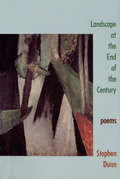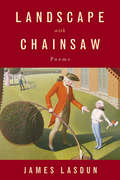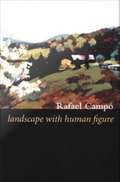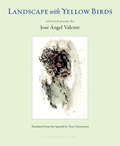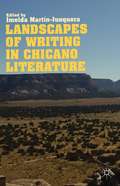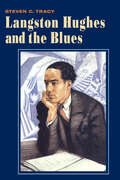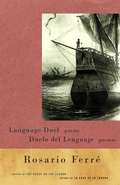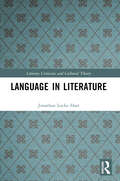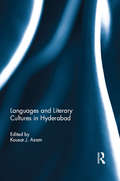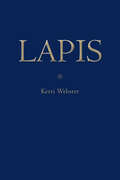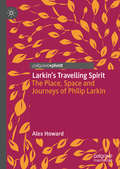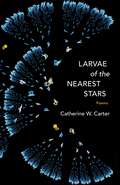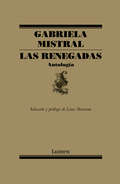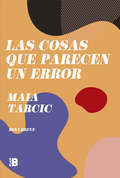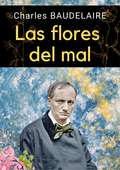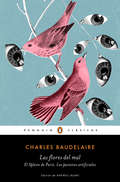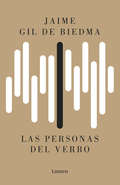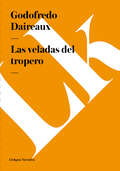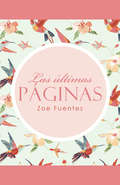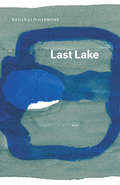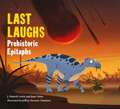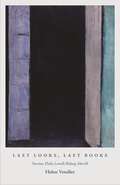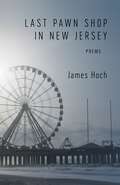- Table View
- List View
Landscape at the End of the Century: Poems
by Stephen Dunn"Here is the mature work of a poet who has always managed to delight--but who now demands something more of us. He asks us to enter the twenty-first century with open eyes: attentive to the past, eager for the future, naming what we love."--Judith Kitchen, Georgia Review
Landscape with Chainsaw: Poems
by James Lasdun"Brilliant ....certainly among the most gifted, vivid, and deft poets now writing in English."--Anthony Hecht, author of The Darkness and the Light An exuberant and bold series of poems drawing on the poet's life in the Catskill Mountains. Questions of exile and belonging figure prominently, as does the struggle to find a viable relationship with the natural world. In the chainsaw--the book's central image--all manner of human traits are reflected with an intense, often comical brilliance.
Landscape with Human Figure
by Rafael CampoIn Landscape with Human Figure, his fourth and most compelling collection of poetry, Rafael Campo confirms his status as one of America's most important poets. Like his predecessor William Carlos Williams, who was also a physician, Campo plumbs the depths of our capacity for empathy. Campo writes stunning, candid poems from outside the academy, poems that arise with equal beauty from a bleak Boston tenement or a moonlit Spanish plaza, poems that remain unafraid to explore and to celebrate his identity as a doctor and Cuban American gay man. Yet no matter what their unexpected and inspired sources, Campo's poems insistently remind us of the necessity of poetry itself in our increasingly fractured society; his writing brings us together--just as did the incantations of humankind's earliest healers--into the warm circle of community and connectedness. In this heart-wrenching, haunting, and ultimately humane work, Rafael Campo has painted as if in blood and breath a gorgeously complex world, in which every one of us can be found.
Landscape with Yellow Birds
by Jose Angel Valente Tom ChristensenFor José Ángel Valente, the word was foremost. He was of a generation that came of age under the Franco dictatorship. But unlike many of his contemporaries, he did not often address political or social issues directly in his poems. His influence as a poetic force proved to be much deeper. From the outset Valente's work was bold yet disciplined, immediate yet lyrical, combining poetic precision with a knack for capturing vital moments and a keen ear for musicality. His chief concern was poetry that explored and transcended itself: poetry as knowledge. A poet of unfailing integrity, he never wavered in his pursuit of the truth of the word. Exploring questions of love, loss, and the spirit, he stripped twentieth-century Spanish poetry of its rhetorical excesses, producing contemplative, introspective, and at times mystical verses, rejecting the facile and embracing silence. In his later years, he turned to stirring, highly distilled prose poems in such works as The Singer Does Not Awaken and Landscape with Yellow Birds. Then the clear melody of his early verse gave way to intensely resonant passages that folded in upon each other and opened startling vistas in unexpected directions. This is the first major selection of Valente's work to appear in English.
Landscapes of Writing in Chicano Literature
by Imelda Martín-JunqueraAdding nuance to a global debate, esteemed scholars from Europe and North and Latin America portray the attempts in Chicano literature to provide answers to the environmental crisis. Diverse ecocritical perspectives add new meaning to the novels, short stories, drama, poetry, films, and documentaries analyzed in this timely and engaged collection.
Langston Hughes and the Blues
by Steven C. TracyThe shades and structures of the blues had an immense impact on the poetry of Langston Hughes. Steven C. Tracy provides a cultural context for Hughes’s work while revealing how Hughes mined Black oral and literary traditions to create his poetry. Comparing Hughes’s poems to blues texts, Tracy reveals how Hughes’s experimental forms reflect the poetics, structures, rhythms, and musical techniques of the music. Tracy also offers a discography of recordings by the artists--Bessie Smith, Ma Rainey, Blind Lemon Jefferson, and others--who most influenced the poet.
Language Duel/ Duelo del Lenguaje
by Rosario Ferré"English and Spanish have been at war since Queen Elizabeth sank King Felipe's Spanish Armada in 1588," Rosario Ferré writes in the title poem of Language Duel; "Language carries with it all their fire and power." She explores this tension throughout this explosive collection, which plays with the sensual differences between the languages and lays bare many of the complications facing an increasingly bilingual America. In these poems, Miami is celebrated as a modern Tower of Babel and a place where the layers of history are particularly palpable. Wave after wave of conquerors wash across the Americas. A well-dressed Latino businessman inadvertently reveals his roots at the Ritz when someone steps on his foot, eliciting a profanity--in Spanish. Intimate snapshots capture the nameless heroism of homeless men, the exuberance of a child's affection for her hometown, and memories of lovers. "El español y el inglés han estado en guerra desde que la Reina Isabel hundió la Armada Invencible en el 1588", escribe Rosario Feré en "Duelo del lenguaje", el poema que da el título a esta colección; "los lenguajes llevan con sigo todo su fuego y poderío". Ferré explora las tensiones entre lenguas y culturas a través de esta colección de carácter controversial, que señala muchos de los dilemas a los que se enfrenta hoy una América cada vez más bilingüe. Estos poemas celebran tanto la antiquísima ciudad San Juan como las metrópolis más modernas: Miami, Nueva York, WDC. Pasado y presente, historia y sociedad se mezclan con una inmediatez sorprendente. Ola tras ola de conquistadores estalla sobre Norte América; un hombre de negocios bien vestido inesperadamente revela sus raíces cuando alguien le da un pisotón en el elevador del Ritz y suelta una maldición. Fotos instantáneas de los deambulantes que se desplazan por las calles de la capital, el cariño exuberante que siente un niño por su ciudad natal, los amantes cuya memoria perdura en el recuerdo, el rumor de la lluvia en el patio de atrás, que lava el remordimiento: he aquí algunos de los temas a la vez poéticos y cotidianos que se recogen en este libro.
Language in Literature (Literary Criticism and Cultural Theory)
by Jonathan Locke HartLanguage in Literature examines the overlap and blurring boundaries of English, comparative and world poetry and literature. Questions of language, literature, translation and creative writing are addressed as befitting an author who is a poet, literary scholar and historian. The book begins with metaphor, which Aristotle thought, in Poetics, was the key gift of the poet, and discusses it in theory and practice; it moves from the identity of metaphor to identity in translation and culture; it examines poetry in a comparative and world context; it looks at image and text; it explores literature and culture in the Cold War; it explores the role of the poet and scholar in translating poetry East and West; it places creative writing in theory and practice in context East and West; it concludes by summing up and suggesting implications of creation in language, translating and interpreting, and its expression in literature, especially in poetry.
Languages and Literary Cultures in Hyderabad
by Kousar J. AzamThere is great interest in recent scholarship in the study of metropolitan cultures in India as evident from the number of books that have appeared on cities such as Delhi, Mumbai, Chennai and Kolkata. Though Hyderabad has a rich archive of history scattered in many languages, very few attempts have been made to bring this scholarship together. The papers in this volume bring together this scholarship at one place. They trace the contribution of different languages and literary cultures to the multicultural mosaic that is the city of Hyderabad How it has acquired this uniqueness and how it has been sustained is the subject matter of literary cultures in Hyderabad. This work attempts to trace some aspects of the history of major languages practiced in the city. It also reviews the contribution of the various linguistic groups that have added to the development not just of varied literary cultures, but also to the evolution of an inclusive Hyderabadi culture. The present volume, it is hoped, will enthuse both younger and senior scholars and students to take a fresh look at the study of languages and literary cultures as they have evolved in India's cities and add to the growing scholarship of metropolitan cultures in India.
Lapis (Wesleyan Poetry Series)
by Kerri WebsterIn Lapis, poet Kerri Webster writes into the vast space left by the deaths of three women: her mother, a mentor, and a friend. Using a wide array of lyric forms and meditations, Webster explores matrilineages both familial and poetic, weaving together death, spirituality, women, and a sense of the shifting earth into one "doctrine of Non-linear Revelation." Elegy And I was equal to my longing:the mums blackening; sorrow a carboned figurine; the firmament steaming; your ashesinterred in the boulder;the ugly birds crying dolor dolor dolor;the sky smoke-choked—what, then, would you have had be my register?As the beasts of the field rub their antlers off with ooh-itch pleasure; as the screen says You often open around this time; as the grapesblight: listen: sometimes we're the pilgrim, sometimes we're the site.
Larkin’s Travelling Spirit: The Place, Space and Journeys of Philip Larkin
by Alex HowardThis book examines Larkin’s evocation of place and space, along with the opportunities for self-discovery offered by the act and thought of travel. From his canonical verse to his lesser-known juvenilia and dream diaries, this title unveils a new Larkin; a man whose religious, political and ontological affiliations are often as wide-ranging and experimental as the very form and symbolic licence used to express them. Whether exploring Larkin’s fondness for deictics (‘pointing’ words, like here/there), his fascination with death, or his interest in the sexual opportunities of an itinerant lifestyle, this monograph provides fresh critical approaches bound to appeal to established Larkin scholars and newcomers alike.
Larvae of the Nearest Stars: Poems
by Catherine W. CarterLarvae of the Nearest Stars offers deeply serious verse that packs profound emotional and spiritual power while encouraging readers to laugh out loud. Catherine W. Carter’s quirky, accessible poems bridge and question binaries—human and nonhuman, lyric and narrative, science and magic, river trash and galaxies. The poems’ subjects range from dowsers and liver spots to the mysteries of two-seater outhouses and encounters with sentient milk jugs and “our lady of the bagels.” The collection begins and ends by confronting the necessity—and the promise—to bear witness to the world as it is, addressing how we can manage to love the world in the face of everything that makes doing so a challenge. The poems in this engaging and meditative collection are sometimes dark, often funny, but always surprising.
Las Mocedades De Rodrigo
by Matthew BaileyPerhaps the most famous Castilian in history, Rodrigo Diaz ? also known as ?the Cid? ? lived in the second half of the eleventh century, distinguishing himself during the conquest of the Muslim kingdom of Valencia. The epic poem Las Mocedades de Rodrigo (The Youthful Deeds of Rodrigo), is a fictional account of the young Rodrigo?s passage from impetuous initiate to menacing force of nature, and, finally, to ally and servitor of his king. Written around 1300, the poem garnered a significant reputation in its native Spain and is still widely read today. Despite its popularity, an English translation has never been published.This bilingual edition offers both the Old Spanish version of Las Mocedades as well as the first English translation of the epic poem. In his introduction, Matthew Bailey examines the text as a compilation of oral narratives passed down from speakers to scribes. Situating it fully within the tradition of Spanish epic poetry, Bailey goes on to review the poem?s critical reception, explains the hybrid nature of the narrative, and looks at the origins of the hero himself. The translation includes explanatory notes to help the contemporary English-language reader understand the social and political circumstances surrounding the poem.For those interested in the poetry of medieval Spain, the epic tradition, or for anyone looking for a good adventure story, Las Mocedades de Rodrigo will be essential reading.
Las Renegadas: Antología
by Gabriela MistralEn Las renegadas, Lina Meruane propone una nueva lectura para la poesía de Gabriela Mistral Lina Meruane selecciona, reordena con atrevimiento y prologa a la Premio Nobel de Literatura, permitiendo leer de nuevos modos una poesía que ostenta el rango de lo clásico. «La poesía dialogante de la Mistral reniega del poder del territorio, entabla una relación fluida con la tierra y nos deja como legado la posibilidad de acabar con los viejos modelos de sociedad», dice Meruane en su prólogo. Y en efecto aquí vemos cómo la rebeldía, la extranjería, la incomodidad y la aspereza son los ejes de una poética singular, poderosa, que no sólo ha resistido el paso del tiempo, sino que ha sabido dejarse leer de distintos modos.
Las cosas que parecen un error
by Maia TarcicEstos poemas posan la atención en los detalles; dan vueltas y vueltas alrededor de esos hallazgos e intentan responder con sensualidad y sutileza por qué todas las cosas caprichosas y que parecen un error igual nos fascinan. Estos poemas posan la atención en los detalles: los dedos de las manos de un amante, un montón de CD junto a un tacho de basura, el olor particular de una prenda escondida en el fondo del placar, los gestos de un amigo, el andar de un perro. Son versos que condensan sentimientos, atrapan con su observación precisa esos instantes en los que una historia de amor empieza o termina, una fiesta se arruina o se enciende, la noche se desvanece. Los versos de Maia Tarcic dan vueltas y vueltas alrededor de esos hallazgos, intentan responder con sensualidad y sutileza por qué todas las cosas caprichosas y que parecen un error igual nos fascinan. Otra mujerEn otro ladoTampoco puede dormirmujer, ¿me oye pensar?
Las flores del mal
by Charles BaudelaireEs una obra cumbre de la poesía moderna. Sus composiciones rompen con el estilo convencional, en uso hasta entonces, y rejuvenecen la estructura del verso mediante el uso regular de encabalgamientos, rechazos y contrarrechazos. Esto renueva la forma rígida del soneto. Utiliza imágenes sugestivas mediante asociaciones a menudo inéditas, tales como el "Ángel cruel que azota los soles" (Le Voyage). Mezcla el lenguaje erudito con el discurso cotidiano. Rompiendo con un romanticismo que, durante medio siglo, ha alabado la naturaleza hasta trivializarla, celebra la ciudad y, más concretamente, París. Esta obra difiere de una colección clásica, en la que a menudo solo el azar reúne poemas generalmente dispares. Se articulan metódicamente y según un diseño preciso, para cantar con absoluta sinceridad: - el sufrimiento de este mundo considerado según el dogma cristiano del pecado original, que implica la expiación ; - el disgusto del mal - y a menudo de uno mismo ; - la obsesión por la muerte; - la aspiración a un mundo ideal, accesible a través de misteriosas correspondencias. Alimentada por sensaciones físicas que la memoria restituye con agudeza, la obra expresa una nueva estética en la que el arte poético yuxtapone la paleta cambiante de los sentimientos humanos y la visión lúcida de una realidad a veces trivial con la más inefable belleza. Esta obra influyó considerablemente en poetas posteriores como Arthur Rimbaud, Paul Verlaine y Stéphane Mallarmé.
Las flores del mal | El Spleen de París | Los paraísos artificiales
by Charles BaudelaireLos mejores libros jamás escritos. «El Poeta es igual a este rey de las nubesque se ríe de las flechas y vence el temporal;desterrado en la tierra y en medio de las gentes,sus alas de gigante le impiden caminar.» Padre de la modernidad y poeta maldito por excelencia, Baudelaire abrió las puertas a un mundo hasta entonces vetado a la literatura con Las flores del mal, una «ofensa a la moral» por la que fue procesado. A través de sus versos, la lírica dejaba atrás los paisajes bucólicos y las pasiones elevadas para hundirse en la bohemia parisina. Lejos de amedrentarse ante la incomprensión de sus contemporáneos, Baudelaire ahondó aún más si cabe en esos parajes oscuros con el florilegio de prosa poética de El spleen de París y el ensayo Los paraísos artificiales, en el que narra sus experiencias con el opio y el hachís. Tras ellos se revela la decadencia de unos ideales duramente criticados, la melancolía, el deseo de la inasible eternidad y el terrible miedo al paso del tiempo, jamás clemente. La presente edición presenta la soberbia versión que ofreció el gran poeta valenciano Lluís Guarner, así como algunos poemas traducidos por el propio editor de este volumen, Andreu Jaume.
Las metamorfosis
by OvidConsiderada una de las obras maestras de la literatura latina, Las metamorfosis es un vasto poema en quince libros, basados en la mitología y en la literatura helénicas. La obra contiene 246 leyendas mitológicas que explican las diversas formas externas que adoptaron los personajes y cosas de la antigüedad desde el comienzo del caos hasta la transformación de julio Cesar. La obra está escrita en verso heroico, en hexámetros.
Las personas del verbo (Biblioteca Breve/seix Barral Ser.)
by Jaime Gil de BiedmaLa poesía reunida de Jaime Gil de Biedma en una edición conmemorativa por el veinticinco aniversario de su muerte. En 1975 Jaime Gil de Biedma reunió su poesía bajo el título Las personas del verbo, donde incluyó sus tres libros: Compañeros de viaje, Moralidades y Poemas póstumos, revisados y ordenados para la ocasión. En 1982 publicó una segunda edición, ampliada con los escasos poemas que había escrito hasta entonces. Ese fue el corpus de su obra poética que el autor consideró definitiva y cerrada, y es la que aquí reeditamos. Las personas del verbo es ya un clásico de la poesía española del siglo XX. Destaca por su afán de perfección, su transparente complejidad, su lucidez y su capacidad evocativa y meditativa. Hoy, a los veinticinco años de la muerte del poeta, Las personas del verbo quiere ser un homenaje y un reconocimiento a la vigencia absoluta de la poesía del Jaime Gil de Biedma. Reseña:«Su poesía sencilla y directa te toca el corazón. Gil de Biedma es un poeta de todos. Te recuerda la importancia de la vida sin más atributos que ella misma.»Manuel Vilas «Como todos los escritores que han tocado la fibra íntima de sus lectores, cada uno tiene su Gil de Biedma.»La Vanguardia
Las veladas del tropero
by Godofredo DaireauxLas veladas del tropero tells a series of stories set in Argentina's 19th century haciendas.
Las últimas páginas
by Zoe Fuentes<P>Poemario de amor de una joven voz de hoy en día. <P>Amor en todas sus formas: ése ha sido el tema elegido por Zoe Fuentes para los versos recogidos en este libro. <P>Desde los enamoramientos más apasionados hasta los limbos entre el amor y el odio o las luchas interminables por olvidar a alguien, la autora logra plasmar todos esos sentimientos en esta colección de poemas que promete hacer revivir al lector sus viejos amores o bien, encontrar desahogo para los actuales. <P> Tiene en sus manos no sólo la obra de una autora joven, sino un escrito lleno de pasión que lo llevará a preguntarse por la profundidad y complejidad de las emociones humanas.
Last Lake
by Reginald GibbonsFrom Ritual A slow parade of old west enthusiasts, camp song and hymn, came in along the winding way where rural declined to suburban, slow riders and wagoners passing a cow staked to graze, some penned cattle looking vacantly up--not in vacant lots the ancient icons of wealth they had been in odes, prayers and epics, in sacrifices and customs of bride-price or dowry. (It's good people no longer make blood sacrifices, at gas stations and stores, for example, and in the crunching gravel parking lots of small churches--oh but we do.) "The evening forgives the alleyway," Reginald Gibbons writes in his tenth book of poems--but such startling simplicities are overwhelmed in us by the everyday and the epochal. Across the great range of Gibbons's emblematic, vividly presented scenes, his language looks hard at and into experience and feeling. Words themselves have ideas, and have eyes--inwardly looking down through their own meanings, as the poet considers a lake in the Canadian north, a Chicago neighborhood, a horse caravan in Texas, a church choir, a bookshelf, or an archeological dig on the steppes near the Volga River. The last lake is the place of both awe and elegy.
Last Laughs: Prehistoric Epitaphs
by Jane Yolen J. Patrick LewisPoems framed as epitaphs for extinct prehistoric animals hit the proverbial (coffin) nail on the head in this darkly humorous collection from expert poets Jane Yolen and J. Patrick Lewis.Macabre, ironic, and witty epitaphs share how prehistoric creatures like the terror bird, the woolly mammoth, and the T-rex met their demise. The ever-entertaining J. Patrick Lewis and the inimitable Jane Yolen offer a collection organized by era, with posthumous poems paired with short secondary text providing additional, factual information about each creature.
Last Looks, Last Books: Stevens, Plath, Lowell, Bishop, Merrill (The A. W. Mellon Lectures in the Fine Arts #56)
by Helen VendlerModern American poets writing in the face of deathIn Last Looks, Last Books, the eminent critic Helen Vendler examines the ways in which five great modern American poets, writing their final books, try to find a style that does justice to life and death alike. With traditional religious consolations no longer available to them, these poets must invent new ways to express the crisis of death, as well as the paradoxical coexistence of a declining body and an undiminished consciousness. In The Rock, Wallace Stevens writes simultaneous narratives of winter and spring; in Ariel, Sylvia Plath sustains melodrama in cool formality; and in Day by Day, Robert Lowell subtracts from plenitude. In Geography III, Elizabeth Bishop is both caught and freed, while James Merrill, in A Scattering of Salts, creates a series of self-portraits as he dies, representing himself by such things as a Christmas tree, human tissue on a laboratory slide, and the evening/morning star. The solution for one poet will not serve for another; each must invent a bridge from an old style to a new one. Casting a last look at life as they contemplate death, these modern writers enrich the resources of lyric poetry.
Last Pawn Shop in New Jersey: Poems
by James HochWith Last Pawn Shop in New Jersey, James Hoch gives readers a heart-lugged romp and a work of resistance, conversing with the interstices of public and personal histories and identities in the context of ecological deterioration. Drawing on emotional experiences prompted by his brother’s going to war in Afghanistan, the death of his mother from ovarian cancer, and the raising of his sons, Hoch investigates the difficulty of loving and of making beauty in times of crisis when faced with knowledge of its limitations and necessity. Lyrical and meditative, intense and intimate, his poems evoke landscapes with views of the New York water supply system, industrialization along the Hudson River, and the geology of the Palouse in the Pacific Northwest.A bare-knuckled argument for the sublime in the context of war and environmental degradation, Last Pawn Shop in New Jersey asserts the redemptive power of art as survival.
